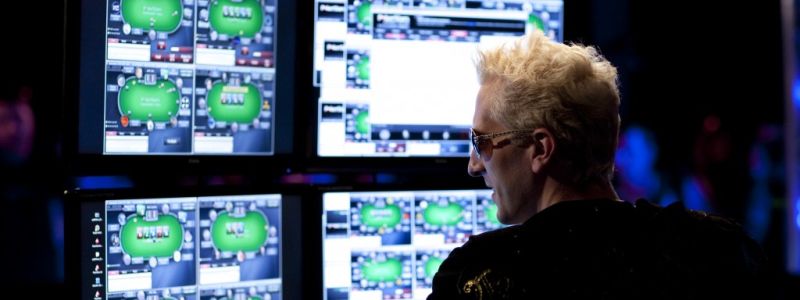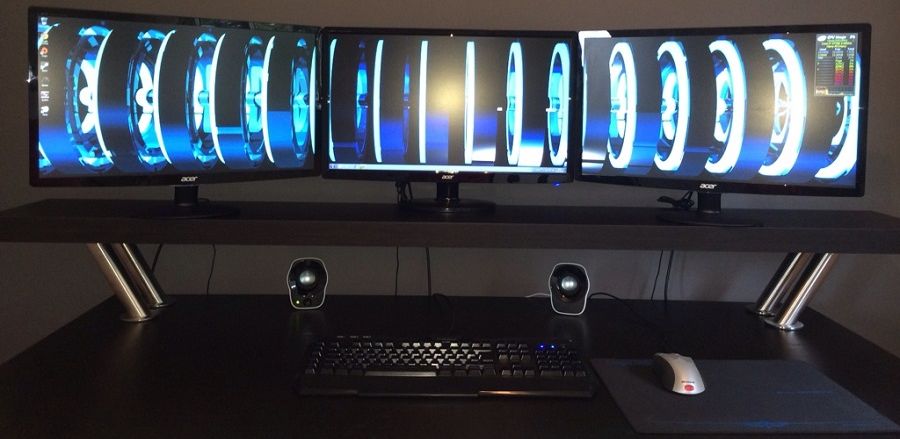
Unless you're a seasoned PioSolver user or you enjoy playing 16 tables at the same time with Holdem Manager, Note Cady, Table Ninja and four other pieces of poker software running in the background, you can get by with almost any PC manufactured in the last five years or so.
That being said, playing poker on a 4-year-old mid-range business laptop can be far from enjoyable especially if the old age is getting to it and it starts exhibiting some stability problems caused by poor thermal performance. Even a reasonably new mobile computer can start to heat up your wrists once you put it through its paces when playing a long Sunday tournament session. Desktop machines are on average a lot more powerful than their mobile counterparts and they can provide you with a much better experience.
While some of you might be technologically inclined, playing poker and building PCs don't really go hand in hand. Prebuilt PCs available in stores are often put together in a way that's not really optimal for poker players. It takes a considerable amount of research to gain enough knowledge to make good decisions when it comes to choosing PC components and building a PC. Fortunately, for you, this article is all you really need in order to build the ultimate poker workstation.

How to Build a PC
While the process of building a PC isn't that complicated (It's basically like putting together an interesting set of Legos with only potential danger and difficulty being the fact that it can get damaged by electrostatic discharge) the first time is always intimidating and the process will be slightly different for each set of components.
That's why your two best options will be either, finding a friend that can help you put together the components that you order or finding a store that's willing to do that for you (build a PC that is and not find you a friend that can build one).
Quick Overview of PC Components
Processor: This is the brain of your machine responsible for the speed and the number of tasks your PC is able to perform. While you don't really need a monstrous CPU to open a poker client once you add a few pieces of poker software, a browser with millions of tabs open, a media player etc. you can challenge even some of the great modern chips.
Motherboard: This is the main component of your PC that every other part is connected to. The motherboard provides you with input/output ports (display ports, USB for peripheral devices, SATA ports for drives etc.) and it's responsible for the overall stability of the system, but it doesn't really add anything when it comes to performance.
RAM: Random access memory. You can get by with 4GB, 8GB is the sweet spot and 16GB offers some peace of mind for the near future.
Solid State Drive: Every modern PC needs one. While hard drives offer more disk space for the same price SSD's are significantly faster which is very important for a good machine dedicated to poker.
Power Supply: This is an often overlooked component that's routinely treated as an afterthought in prebuilt PCs (one of the main reasons why you should avoid those), which is really a shame since the power supply is probably the most important element of your entire system when it comes to stability and longevity.
Case: Another component that's severely lacking in prebuilt PCs. A proper case should provide your PC with an adequate airflow, dust filters (that help keep the inside of your machine nice and tidy) and a pleasing visual design. When it comes to poker it's also a good idea to invest in silence optimized case in order to eliminate all of the potential distractions.
Peripherals: Every computer needs a mouse and keyboard. You might also need to invest in an external WiFi card, webcam for sweat sessions etc. This is largely a matter of personal needs and preferences so I'll leave the decision up to you. If you need any pointers take a look at the options listed in this article.
Graphics Card:Virtually unimportant when it comes to poker. You need some sort of way to connect your display to the PC but fortunately most of the modern processors have a graphic unit integrated into a die so unless you're interested in playing modern games or you want to connect more than two monitors to your PC you don't really have to buy a dedicated graphics cards. Since this is a poker related article we're going to assume that this isn't the case and therefore there are no dedicated graphics cards in PC builds listed below (though power supplies included in them are strong enough to handle most GPU's if you choose to upgrade your PC with one in the future).

(Reasonably) Low Budget Build
If you're tired of playing poker on a random laptop and you finally decided to enter the realm of glorious PC master race this is the build that will meet most of your poker needs. It's not very cheap, but it can handle most of the things you can throw at it barring some crazy stuff like complex PioSolver equations or insane multi-tabling sessions with tens of different programs running in the background.
CPU: Intel Core i5-6400
CPU Cooler: Cooler Master: Hyper 212 EVO
Motherboard: MSI B150M Mortar
SSD: GoodRAM Iridium Pro 240 GB
RAM: 2x 4GB HyperX 2133 MHz CL14 (or any other 8GB kit of DDR4 RAM from a reputable brand like Kingston, Crucial, G.Skill etc.)
Power Supply: Corsair cx500
Case: Fractal Design Define Mini (alternative: Cooler Master Silencio 352)

The Sweet Spot
For 99% of the poker player population, this PC can handle absolutely everything. From monster sessions, and PioSolver calculations to streaming via Twitch.tv. It will be fast, reliable, quiet and a pleasure to use.
CPU: Intel Core i7-6700K
CPU Cooler: Thermalright Macho HR-02 BW
Motherboard: Gigabyte GA-Z170 Gaming K3
SSD: Samsung 850 EVO 500 GB
RAM: 2x 8GB G.Skill 3000 MHz CL15
Power Supply: Corsair RM650x
Case: Fractal Design Define R5

The High-End Poker Rig
If you have the coin to spare you can't get any better than this. Most people won't be able to utilize such a powerful PC so unless you're a high stakes baller that's really into content creation (streaming, video editing etc.) just go for the sweet spot poker PC listed above.
CPU: Intel Core i7-5820K
CPU Cooler: Thermalright Macho X2
Motherboard: Gigabyte GA X99-SLI
SSD: Samsung 850 PRO 512 GB
RAM: 4x 4GB G,SKill 3200 MHz CL16
Power Supply: Seasonic PRIME 650W Titanium
Case: Fractal Design Define R5
More Top Rated Content
Articles
- Limitations of a HUD
- Zoom Poker Strategy Guide
- Protect Against Malware and Hackers - Keep Your Poker Account Safe
Coaching Videos


